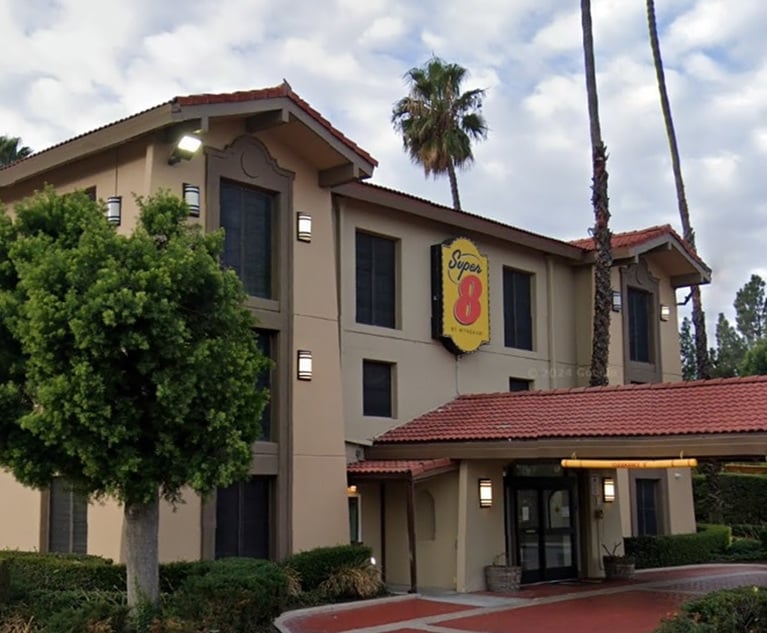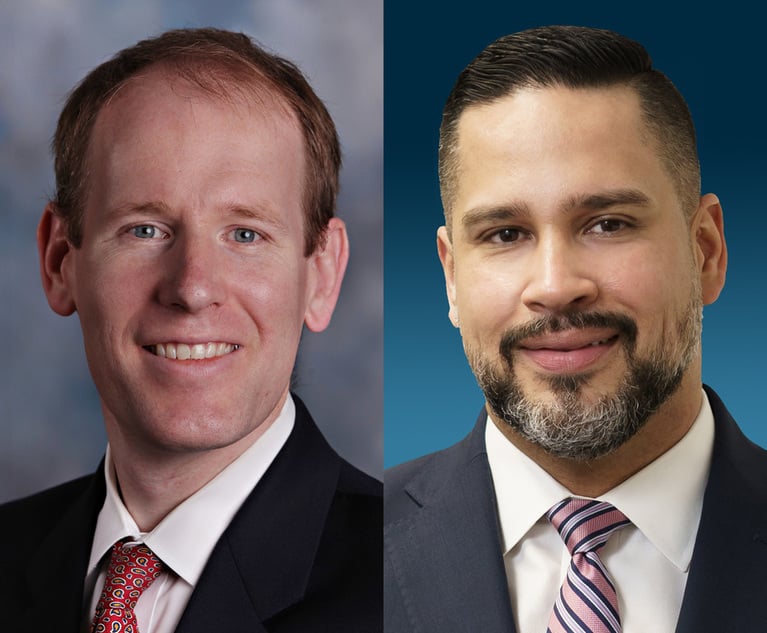Unpublished Opinions for the Week of August 21, 2017
42-2-4038 Bart Commodities v. Hudson Coffee, Inc., N.J. Super. App. Div. (per curiam) (6 pp.) Plaintiffs appealed from the orders denying the appointment…
August 17, 2017 at 03:35 PM
101 minute read
42-2-4038 Bart Commodities v. Hudson Coffee, Inc., N.J. Super. App. Div. (per curiam) (6 pp.) Plaintiffs appealed from the orders denying the appointment of a receiver, dissolving all prior restraints, denying plaintiffs' motion to amend their complaint, and dismissing plaintiffs' complaint with prejudice. Plaintiffs were creditors of defendant, and sought to file an amended complaint years following the conclusion of a bankruptcy action and state court action resolving defendant's debts. Specifically, plaintiffs alleged they were holders of a loan taken out by defendant in the amount of $50,000, and that defendant also owed them over $17,000 on an invoice. In 2005, defendant filed for Chapter 7 bankruptcy and a trustee was appointment, with plaintiff Bart Commodities named as a creditor. The trustee filed an action against defendant for fraudulent transfers, and alleged that other entities connected to defendant were responsible as defendant's successors to its creditors. The trustee ultimately reached settlement, and defendant's estate was fully administered and the trustee discharged. After plaintiff Go Coffee, LLC purchased a two-thirds interest in Bart's claim against defendant, plaintiffs filed the present claims and sought removal to bankruptcy court to reopen defendant's bankruptcy proceeding. The bankruptcy court remanded to the trial court to determine whether the statute of limitations had expired. Plaintiffs' complaint sought payment of the loan, due in 2000, and the invoice due in 2002. Go Coffee also sought to collect on an acquired judgment due in 2008. Plaintiffs acknowledged that the respective limitations periods had passed, but argued on appeal that the limitations periods should nonetheless be tolled. Specifically, plaintiffs argued that defendant's fraudulent activities tolled the limitations period, and their new litigation should relate back to prior litigation. However, the court affirmed the dismissal of plaintiffs' action as untimely, holding that plaintiffs could not get around the limitations period by seeking appointment of a receiver or reframing past claims under new legal theories.
46-2-4027 Venezia v. Union County Prosecutor's Office, N.J. Super. App. Div. (per curiam) (16 pp.) Appellant filed a three-count complaint against all defendants alleging violations of her civil rights, malicious prosecution, and the filing of false police reports following her arrest and incarceration without alleged probable cause. She further contended that the handling of the investigation deprived appellant of her liberties, resulting in mental and emotional anxiety, and physical injury. On motion, the trial judge granted summary judgment in favor of respondents concluding appellant failed to satisfy the New Jersey Tort Claims Act requirement that she suffered a permanent injury as well as noting the respondent-officers were immune from liability under N.J.S.A. 59:3-3. Further, the trial judge held no reasonable jury could conclude that respondent-officers did not act either objectively or subjectively reasonably based on state law or any violation of her civil rights. On appeal, the court affirmed holding appellant's allegation that the respondent-officers acted with malice was not sufficient to defeat immunity as they acted in an objectively reasonable manner. The court noted the respondent-officers interviewed the parties, evaluated the information, assessed the situation, and exercised their law enforcement function. Finally, the court held summary judgment was warranted in favor of respondents-borough and police department under the principles announced in Monell v. Dep't of Soc. Servs., 436 U.S. 658, 98 S. Ct. 2018, 56 L. Ed. 2d 611 (1978).
11-2-4028 Dharia v. Om Riddhi Siddhi, LLC, N.J. Super. App. Div. (per curiam) (11 pp.) Plaintiffs complaint alleged 5 causes of action arising from defendants' alleged breach of an oral contract, wherein plaintiffs agreed to provide consulting services and startup capital to defendants, who sought to purchase and operate Dunkin' Donuts franchises. In exchange, defendants agreed to compensate plaintiffs with a 1/3 equity ownership interest in each of the franchise stores, and periodic distributions of 1/3 of the stores' profits. During discovery, plaintiffs sought documents of business and bank records, corporate audits, profit and loss statements, accounting reports, and corporate and personal tax returns stretching back 10 years. Defendants objected to most of the discovery as overbroad, or seeking privileged or nonexistent information. Plaintiffs filed their first motion to compel discovery, which the trial court granted only to the extent of requiring inspection of documents defendants identified as in his office. Defendants subsequently moved for summary judgment, while plaintiffs cross-moved to compel further discovery, alleging defendants failed to comply with the first order. The trial court granted defendants' motion and denied plaintiffs' motion, finding no evidence of an alleged oral agreement. The trial court denied defendants' subsequent motion for frivolous claim sanctions. On appeal, the court reversed summary judgment, noting that, in addition certifications asserting the formation and terms of the alleged oral agreement, plaintiffs produced evidence of a check from plaintiffs to defendants, bank accounts listing plaintiffs, defendants, and other purported investors in the franchises, emails discussing profit distributions, and meeting minutes concerning plaintiffs alleged ownership interests. The court held that this evidence established genuine issues of material fact precluding summary judgment, and in any event, ruled that the trial court should have permitted discovery to continue before granting summary judgment.
This content has been archived. It is available through our partners, LexisNexis® and Bloomberg Law.
To view this content, please continue to their sites.
Not a Lexis Subscriber?
Subscribe Now
Not a Bloomberg Law Subscriber?
Subscribe Now
NOT FOR REPRINT
© 2025 ALM Global, LLC, All Rights Reserved. Request academic re-use from www.copyright.com. All other uses, submit a request to [email protected]. For more information visit Asset & Logo Licensing.
You Might Like
View All



Trending Stories
- 1Uber Files RICO Suit Against Plaintiff-Side Firms Alleging Fraudulent Injury Claims
- 2The Law Firm Disrupted: Scrutinizing the Elephant More Than the Mouse
- 3Inherent Diminished Value Damages Unavailable to 3rd-Party Claimants, Court Says
- 4Pa. Defense Firm Sued by Client Over Ex-Eagles Player's $43.5M Med Mal Win
- 5Losses Mount at Morris Manning, but Departing Ex-Chair Stays Bullish About His Old Firm's Future
Who Got The Work
J. Brugh Lower of Gibbons has entered an appearance for industrial equipment supplier Devco Corporation in a pending trademark infringement lawsuit. The suit, accusing the defendant of selling knock-off Graco products, was filed Dec. 18 in New Jersey District Court by Rivkin Radler on behalf of Graco Inc. and Graco Minnesota. The case, assigned to U.S. District Judge Zahid N. Quraishi, is 3:24-cv-11294, Graco Inc. et al v. Devco Corporation.
Who Got The Work
Rebecca Maller-Stein and Kent A. Yalowitz of Arnold & Porter Kaye Scholer have entered their appearances for Hanaco Venture Capital and its executives, Lior Prosor and David Frankel, in a pending securities lawsuit. The action, filed on Dec. 24 in New York Southern District Court by Zell, Aron & Co. on behalf of Goldeneye Advisors, accuses the defendants of negligently and fraudulently managing the plaintiff's $1 million investment. The case, assigned to U.S. District Judge Vernon S. Broderick, is 1:24-cv-09918, Goldeneye Advisors, LLC v. Hanaco Venture Capital, Ltd. et al.
Who Got The Work
Attorneys from A&O Shearman has stepped in as defense counsel for Toronto-Dominion Bank and other defendants in a pending securities class action. The suit, filed Dec. 11 in New York Southern District Court by Bleichmar Fonti & Auld, accuses the defendants of concealing the bank's 'pervasive' deficiencies in regards to its compliance with the Bank Secrecy Act and the quality of its anti-money laundering controls. The case, assigned to U.S. District Judge Arun Subramanian, is 1:24-cv-09445, Gonzalez v. The Toronto-Dominion Bank et al.
Who Got The Work
Crown Castle International, a Pennsylvania company providing shared communications infrastructure, has turned to Luke D. Wolf of Gordon Rees Scully Mansukhani to fend off a pending breach-of-contract lawsuit. The court action, filed Nov. 25 in Michigan Eastern District Court by Hooper Hathaway PC on behalf of The Town Residences LLC, accuses Crown Castle of failing to transfer approximately $30,000 in utility payments from T-Mobile in breach of a roof-top lease and assignment agreement. The case, assigned to U.S. District Judge Susan K. Declercq, is 2:24-cv-13131, The Town Residences LLC v. T-Mobile US, Inc. et al.
Who Got The Work
Wilfred P. Coronato and Daniel M. Schwartz of McCarter & English have stepped in as defense counsel to Electrolux Home Products Inc. in a pending product liability lawsuit. The court action, filed Nov. 26 in New York Eastern District Court by Poulos Lopiccolo PC and Nagel Rice LLP on behalf of David Stern, alleges that the defendant's refrigerators’ drawers and shelving repeatedly break and fall apart within months after purchase. The case, assigned to U.S. District Judge Joan M. Azrack, is 2:24-cv-08204, Stern v. Electrolux Home Products, Inc.
Featured Firms
Law Offices of Gary Martin Hays & Associates, P.C.
(470) 294-1674
Law Offices of Mark E. Salomone
(857) 444-6468
Smith & Hassler
(713) 739-1250






